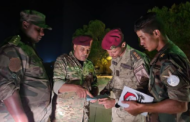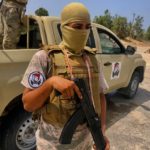In Tripoli, Prime Minister of the Government of National Accord (GNA), Fayez Al-Sarraj, fired his influential Interior Minister, Fathi Bashagha, and placed him under investigation. In a statement released on Friday by GNA’s media office, Al-Sarraj said Bashagha would be investigated by the GNA leadership within 72 hours over his handling of street protests and a violent crackdown.
In Sirte, the Libyan National Army, led by General Khalifa Haftar, has denied on August 28 that its units had targeted the Government of National Accord forces in western Sirte.
In Misrata, dozens of people have rallied in Libya’s third-largest city, for a second consecutive day on August 24 to denounce corruption and deteriorating public services.
On the international level, the Speaker of Tunisian Parliament, Rached Ghannouchi said on August 29 that he concurred with the President of the Tunisian Republic, Kais Saied, for the launching of an initiative to help solve the existing crisis in Libya.
The Arab Maghreb Union called on August 24 on neighboring countries to take the initiative to support the announcement by the President of the Presidency Council, Fayez al-Sarraj, and the President of House of Representatives, Aqila Saleh, to stop hostilities in the country.
MISRATA
- dozens of people have rallied in Libya’s third-largest city, Misrata, for a second consecutive day on August 24 to denounce corruption and deteriorating public services. The protest on August 24 came a day after hundreds of people took to the streets of Misrata and more than 1,000 gathered in the capital, Tripoli, to voice their anger over similar concerns. “We’re here to protest against corruption … to fight for our rights and lack of government services,” said 32-year-old Amar Jamil, a demonstrator in Misrata”.
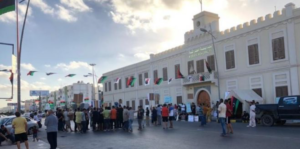
SIRTE
- the Libyan National Army, led by General Khalifa Haftar, has denied on August 28 that its units had targeted the Government of National Accord forces in western Sirte, after the GNA forces operations room in Sirte announced that the army had targeted its forces in the early morning hours with more than 12 rockets. “Some media and social media are reporting false news that the Libyan National Army units have targeted the militias in the area of operations west of Sirte with artillery,” a statement by the LNA spokesperson, Ahmed al-Mismari, said;
- the spokesman of the Libyan Army’s Sirte-Jufra Operations Room Abdelhadi Drah said Khalifa Haftar’s forces had violated the ceasefire on August 27 morning by firing over 12 Grad rockets at their positions. Drah told reporters that the ceasefire violation proved that the forces in Sirte were just militias that abide by no orders, saying Libyan Army forces would be ready to respond to any attacks;
- the city of Sirte, controlled by Haftar’s forces, has been witnessing tension and skirmishes lately, mainly between members from the Qadhadhfa tribe and forces affiliated with Haftar. Sources from the city said that clashes erupted on August 26 between the two sides after Haftar’s gunmen killed a young man from the Qadhadhfa tribe in the city.
TRAGHAN
- a group of gunmen loyal to Khalifa Haftar attacked August 25 a polling station in Traghan municipality in south Libya, stopping the entire elections process in the area. A source from the city said an armed group wearing military uniforms attacked Tuesday morning the polling station in Education College in Traghan as voters were casting ballots.
TRIPOLI
- the Faiez Serraj-aligned Interior Ministry based in Tripoli and led by Fathi Bashagha announced last Friday (28 August) that it had identified one of the suspected government-aligned shooters at the unarmed civilian demonstrators in Tripoli last Monday 24 August. The Ministry said that it had started investigations and questioning the suspect and had identified the (government recognized) force he is part of. It said it will refer him to the Attorney General after completing its investigations and will send a report to the prime minister;
- the Interior Minister of the Tripoli-based Government of National Accord (GNA), Fathi Bashagha, said he is ready to be investigated and to be questioned publicly;
- the Government of National Accord (GNA) announced its decision on August 26 to impose 24-hour curfew, starting this evening, as protesters continue to demonstrate in the capital for the fourth day. Hundreds of people took to the streets in Tripoli on August 23 to protest against GNA corruption and deteriorating living conditions. Protesters marched to the headquarters of GNA to voice anger over what they called a “slow death” due to collapsing public services, corruption and economic pressures, before heading to central Tripoli’s Martyrs Square, where they were scattered by gunfire;
- Martyrs Square in Tripoli, on August 25, witnessed demonstrations for the third day in a row, denouncing corruption and calling for the provision of basic essential services. The demonstrators raised banners calling for improvement in daily living conditions, accountability for those holding positions, involved in corruption cases, demanding the reopening of ports and oil fields to improve the provision of electricity;
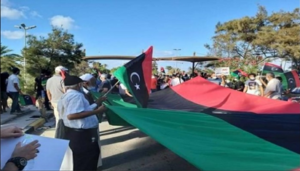
- demonstrations in the Libyan capital, Tripoli, continued for the second day, on August 24, while militias loyal to the government of Fayez al-Sarraj responded by firing tear gas canisters and live ammunition, according to eyewitnesses. The participants in the demonstrations chanted slogans condemning the Al-Sarraj government due to “the deteriorating living conditions, especially the frequent electricity and water cuts, and the cash liquidity crisis.” The demonstrators also chanted slogans denouncing the Syrian mercenaries brought by the Turkish President, Recep Tayyip Erdogan, to Libya to fight with the forces of the Government of National Accord, noting that these mercenaries “receive payments exceeding two thousand dollars while the government has not paid the salaries of the Libyans for months”.
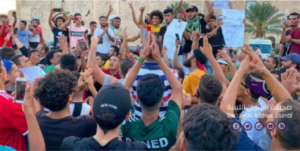
INTERNATIONAL RELATIONS
- the Arab League’s Secretary General Ahmed Aboul-Gheit and UN acting envoy in Libya Stephanie Williams discussed in Cairo on August 30 the latest developments in Libya, especially the need to reopen oil facilities to resume production and exports;
- the Speaker of Tunisian Parliament, Rached Ghannouchi said on August 29 that he concurred with the President of the Tunisian Republic, Kais Saied, for the launching of an initiative to help solve the existing crisis in Libya;
- the United States expressed on August 29 appreciation to its close partnership with the Head of the Libyan Presidential Council of the Government of National Accord Fayez al-Sarraj and his Interior Minister Fathi Bashaga. The US embassy in Libya called in a tweet for cooperation in the interests of providing good governance to the Libyan people;
- the United Nations on August 29 voiced alarm over what it called “a dramatic turn of events” in Libya’s civil war, after a power struggle between leaders of the Tripoli-based government surfaced in the wake of anti-corruption protests. “Libya is witnessing a dramatic turn of events that underlines the urgent need to return to a full and inclusive political process,” the U.N. support mission in Libya said;
- statements by the parties to the conflict in Libya on the start of a ceasefire are encouraging, Moscow calls for an urgent end to hostilities, Russian Foreign Ministry spokeswoman Maria Zakharova said on August 27;
- Algerian President Abdelmadjid Tebboune reaffirmed Algeria’s support to the Libyan people, and expressed appreciation of the statements issued by the President of the Presidency Council Fayez al-Sarraj and the President of House of Representatives, Aqila Saleh, which affirms the political solution to the Libyan crisis and the holding of parliamentary and presidential elections as soon as possible;
- Russia and Italy have renewed their support for the political process in Libya, affirming that the military solution will not end the existing crisis in the country. This came during a telephone conversation between Russian President, Vladimir Putin and Italian Prime Minister, Giuseppe Conte, on August 26, in which they discussed the situation in Libya, regarding the implementation of the Berlin Conference outcomes, according to a statement by the Kremlin on its official website;
- Iranian Foreign Ministry spokesman Saeed Khatibzadeh said on August 24 that his country welcomes the ceasefire agreement in Libya, and wishes stability and tranquility to Libya. “We hope a Libyan-Libyan dialogue will begin as soon as possible so that this will be in the interest of the stability of Libya and the African continent,” Saeed Khatibzadeh said in a press statement;
- the Arab Maghreb Union called on August 24 on neighboring countries to take the initiative to support the announcement by the President of the Presidency Council, Fayez al-Sarraj, and the President of House of Representatives, Aqila Saleh, to stop hostilities in the country, “in order to ensure the speedy return of Libya to its natural Maghreb surrounding.”.




